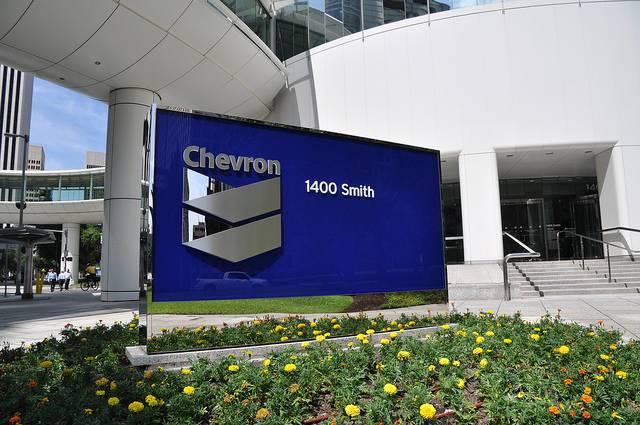
As Chevron’s annual shareholder meeting convenes on Wednesday in Midland, Texas, investors and environmental groups continue to pressure America's second largest energy company to acknowledge the risks that climate change poses to its future business.
To that end, shareholders will be asked to vote on several controversial proposals on the company’s annual proxy statement. The resolutions cover issues related to lobbying and the company's links to governments accused of human rights violations, as well as corporate governance.
Chevron’s critics, including the Union of Concerned Scientists (UCS) and the activist investor network As You Sow, are taking the company to task for several reasons -- ranging from its membership in the American Legislative Exchange Council (ALEC) to the risk of its oil and gas holdings becoming stranded assets.
Stockholders managed to put at least seven proposals related to these issues up for a vote this year. Chevron’s board of directors urged investors to vote “no” on each one.
But there is some indication that Chevron is listening to more of its shareholders’ concerns about the long-term viability of the company in the event that a low-carbon economy becomes reality.
Executives and board members say a recent Chevron report proves that the company is taking climate change seriously. But some investors and environmental activists said the 17-page summary lacked any substantial discussion of climate action strategies.
Nevertheless, Wespath Investment Management withdrew its shareholder resolution earlier this month as a result, saying Chevron’s report was at least a “first step” in nudging the company to consider climate change impacts in its future scenario planning.
Other groups, however, pledged to stay focused on convincing Chevron to change its business practices and reveal the resources it spends on lobbying activities. From their point of view, momentum is on their side; after all, a shareholder resolution on climate resilience that Wespath submitted last year to Chevron’s stockholders scored a 41 percent “yes” vote, which is a practical landslide in the world of proxy statements.
“Investors see climate change as a material financial risk, which underscores the ongoing momentum post-Paris and urgency to prepare for a low-carbon transition,” said Andrew Logan of the investor group Ceres in a written statement.
Other NGOs were far more pointed in their criticism. From UCS’ perspective, the company is far from matching its words with action. In its October 2016 scorecard of Chevron’s climate action agenda, the group described the company’s actions overall as “egregious” for its affiliation with groups including ALEC and the American Petroleum Institute.
UCS also accused Chevron of blocking prior climate resolutions and described the company as slow to distance itself from public relations campaigns that disseminate climate misinformation. “Shareholders should not tolerate Chevron’s efforts to dismiss and deny the very real risks posed by climate change to our planet, to the company’s business model, and to their investments,” UCS’ Kathy Mulvey wrote last year.
Public Citizen, a Washington, D.C. group that views itself as a counterweight against corporate lobbying in the nation’s capital, also urged Chevron to become more transparent about the impacts climate change could have on its business. The organization sent Stephanie Thomas, a former Chevron geologist, to the Midland shareholders’ meeting this morning to call out the company for its current business practices.
Chevron’s milquetoast language in its voting recommendations to shareholders did not help its cause, as both investors and environmentalists show no sign of backing away from the differences they have with the $257 billion company. One proposal was spurred by Chevron’s business ties to a region in Burma, where human rights activists accuse the government of committing atrocities against the Rohingya, an ethnic minority group. Investors asked the company to draft a report later in the year to address the feasibility of a policy that prohibits conducting business with such governments.
But in requesting shareholders to vote “no,” Chevron’s board responded by concluding: “We believe the framework of management systems, policies and processes that we use to guide our business decisions wherever we operate provides clear and consistent guidance and expectations for our investments and operational decisions.”
Chevron will need to do more than keep repeating that it “is committed to operating responsibly” if it hopes to ever gain some measure of trust from its critics.
Image credit: Jonathan McIntosh/Flickr

Leon Kaye has written for 3p since 2010 and become executive editor in 2018. His previous work includes writing for the Guardian as well as other online and print publications. In addition, he's worked in sales executive roles within technology and financial research companies, as well as for a public relations firm, for which he consulted with one of the globe’s leading sustainability initiatives. Currently living in Central California, he’s traveled to 70-plus countries and has lived and worked in South Korea, the United Arab Emirates and Uruguay.
Leon’s an alum of Fresno State, the University of Maryland, Baltimore County and the University of Southern California's Marshall Business School. He enjoys traveling abroad as well as exploring California’s Central Coast and the Sierra Nevadas.














